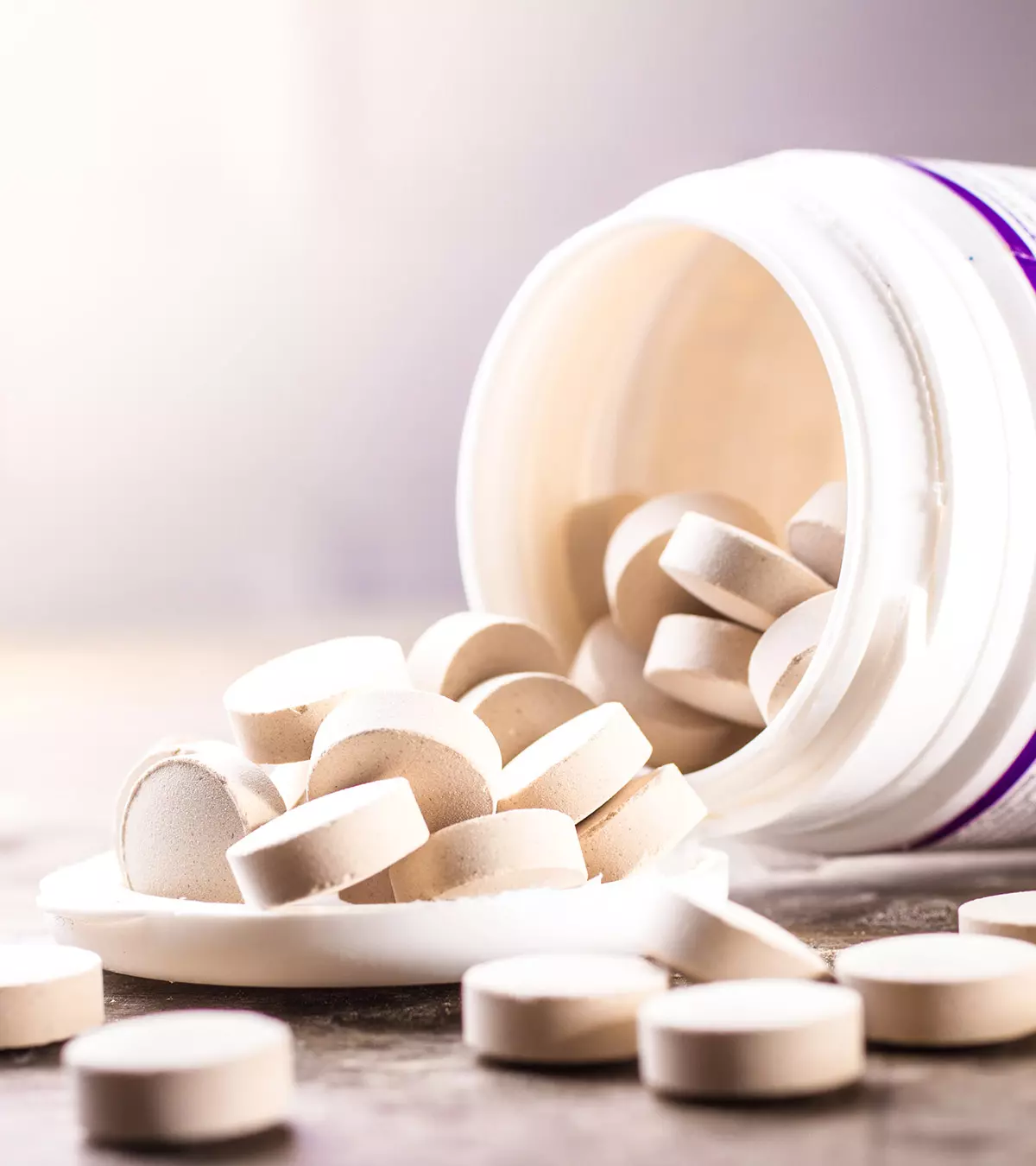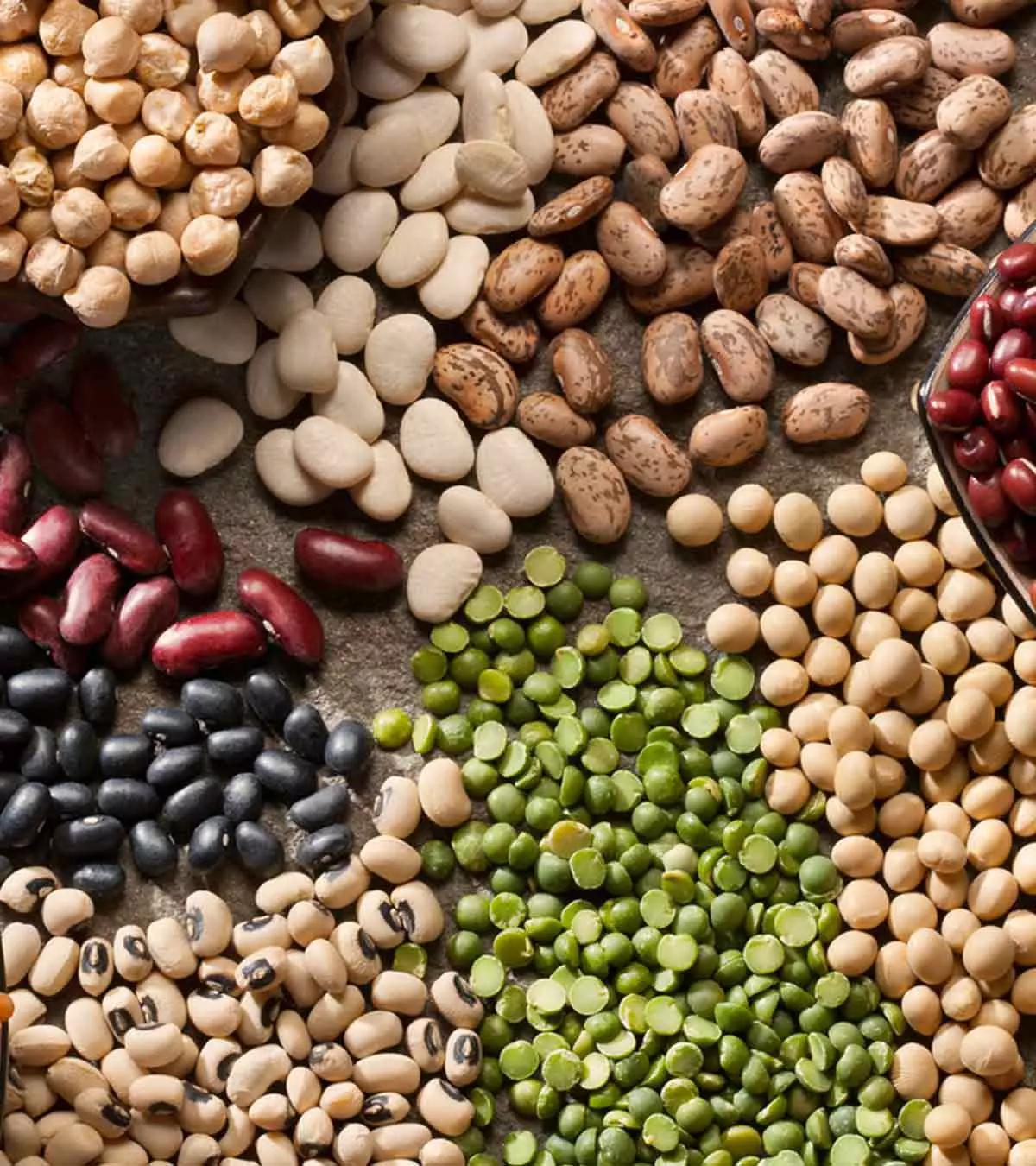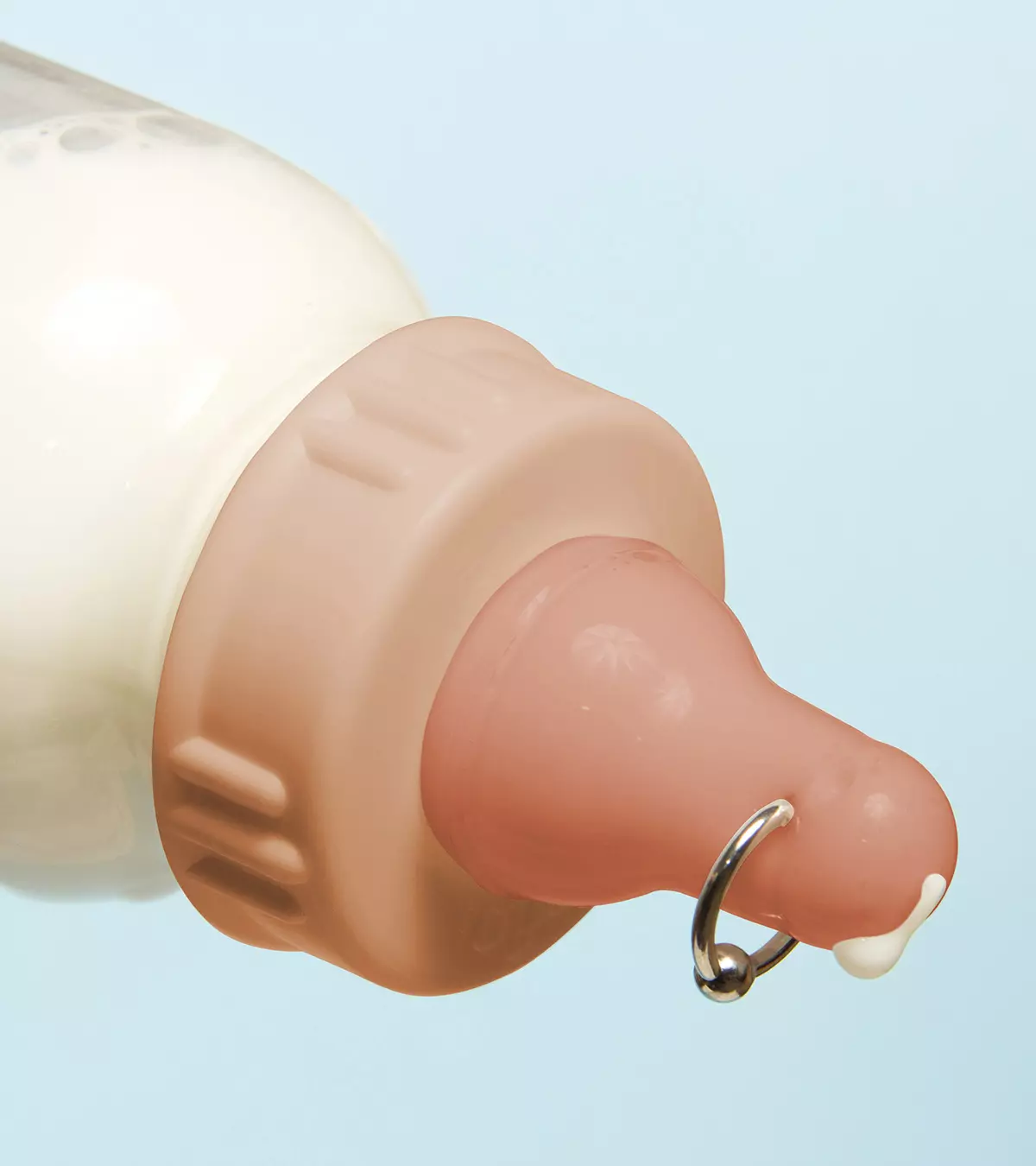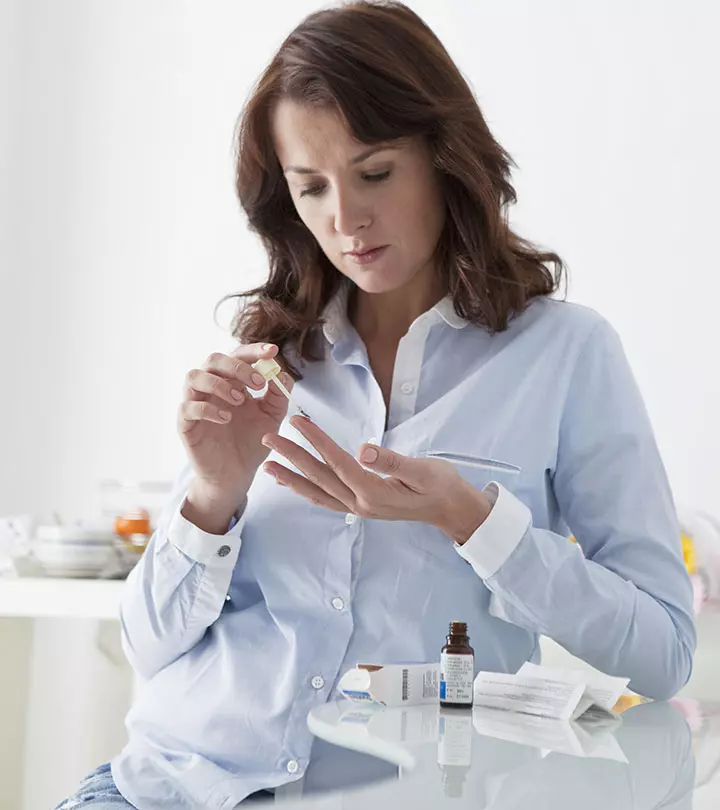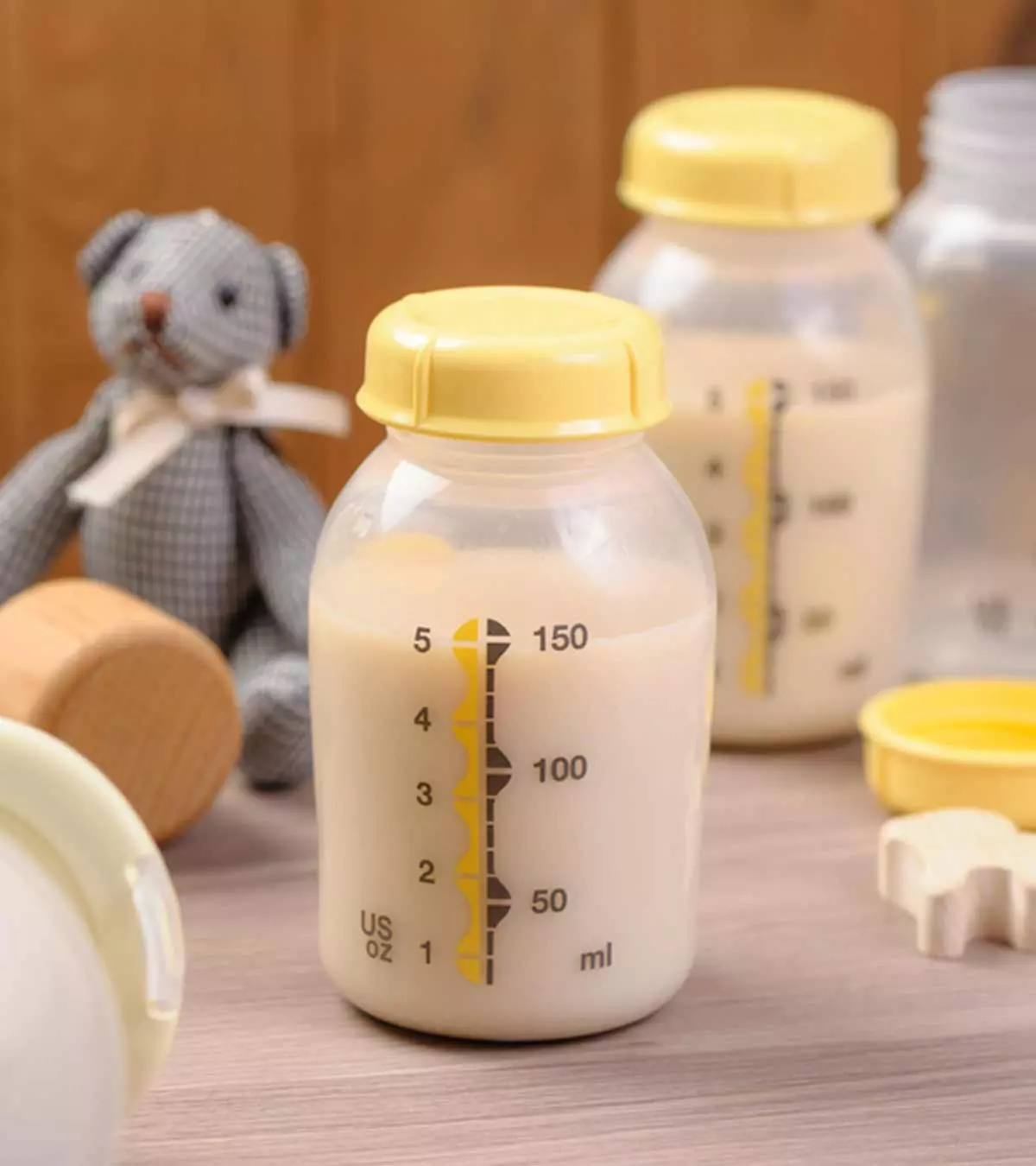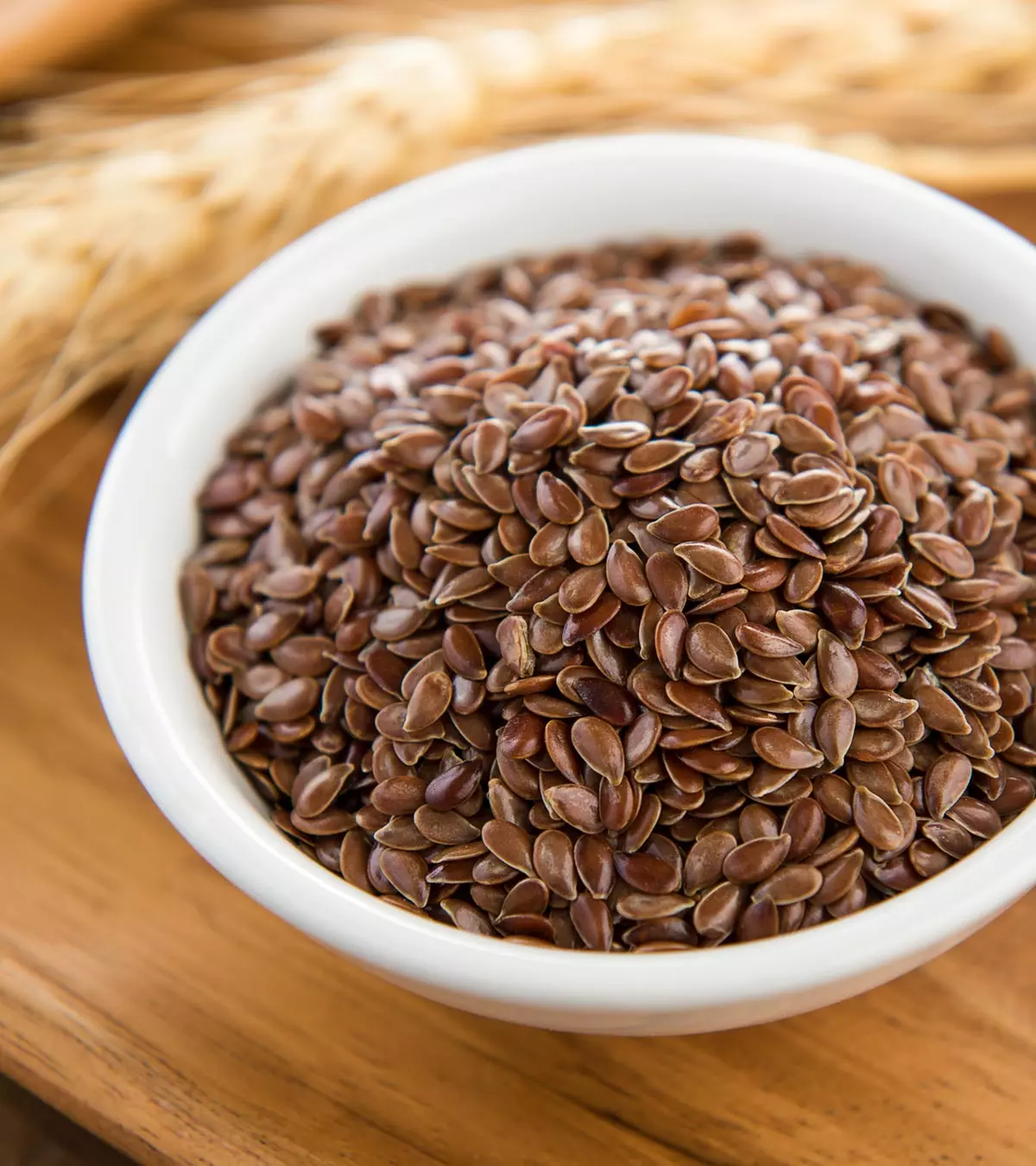
Image: Shutterstock
If you are a nursing mother, you might want to know if it is safe to drink green tea when breastfeeding. Green tea has been reported to contain certain amounts of caffeine, antioxidants, and polyphenolsiAntioxidant compounds found in food items such as fruits, vegetables, coffee, tea, and wine. . Excess consumption of caffeine by a lactating mother might cause lethargy and other adverse conditions. However, consuming green tea in the right amount can improve digestion and make you feel fresh and energized.
Read on to know about the benefits of green tea and the recommended intake quantity during breastfeeding.
Key Pointers
- Green tea is rich in antioxidants, polyphenols, and caffeine.
- Nursing mothers can benefit from consuming green tea in recommended amounts.
- It is important for breastfeeding women to be mindful of the ingredients in teas, as certain harmful substances may be passed on to the baby.
- Excessive consumption of green tea may cause irritability and sleep issues in babies.
- Lactating women should choose safe teas and monitor their caffeine intake to avoid potential risks.
- It is advisable to consult a healthcare professional for guidance before consuming green tea or any new food or beverage while breastfeeding.
Can You Drink Green Tea While Breastfeeding?

Image: Shutterstock
Yes, it is safe to drink green tea or green herbal tea while breastfeeding if consumed in moderate amounts as it will not have any side effects on the baby. Though there is little scientific evidence backing this claim, the American Academy of Pediatrics (AAP) supports it (1).
However, you must select green teas that contain only tea and no other ingredients. The effects of the added herbs in herbal green teas are unknown and could be adverse to an infant. Bottled green tea is also safe during the early days of motherhood as long it is only tea without artificial additives. Sticking to plain green tea is the best way to enjoy the beverage when you are breastfeeding. But, it does not mean that you can drink a cup every hour.
How Much Green Tea Is Safe When Breastfeeding?
Only two cups per day, with each cup of about 237ml, is safe. Green tea is rich in several antioxidants and helps in detoxification, but it also contains caffeine. There is about 29mg of caffeine in a single cup (237ml) while the daily caffeine allowance (from all beverages) during lactation must not be more than 700mg (2). Experts suggest staying way under the upper limit and limiting the consumption of any caffeinated beverage (including green tea) to two cups a day.
Keep in mind that you could be consuming other caffeinated foods such as chocolate, coffee, and soda. Therefore, you will have to adjust your green tea intake in such a way that the total caffeine intake from multiple sources does not exceed the permissible limits.
Exceeding the limits could harm your baby.
What Happens If You Consume Green Tea In Excess?
Drinking too much green tea causes surplus caffeine to transfer into breast milk leading to side effects in the newborn baby:
- Irritability and fussiness

Image: IStock
- Wakefulness and improper sleep
- Colic A condition characterized by an infant crying for three or more hours a day, three or more days a week, for three or more week (3)
Less than 1% of the caffeine filters into your breast milk, but some babies are more sensitive to caffeine because of lower immune system tolerance (4) Be watchful of any signs of side effects even when you consume green tea within safe limits.
Research shows excess green tea intake can lower serum folate levels in mothers. Also, there is a belief that overconsumption of green tea can reduce breastmilk production. That brings us to the next question.
 Quick fact
Quick factDoes Green Tea Reduce Breastmilk?
There is no scientific evidence stating that green tea reduces breast milk production or dries it up completely. However, a chemical called tanniniWater-soluble antioxidants present in plants. found naturally in tea may interfere with iron absorption in the body. It occurs when excess green tea is consumed with iron-rich foods (5) such as green leafy vegetables. There is no impact on one’s nutrition when consumed with animal-based iron foods such as meat (6). But, to be on the safe side, avoid drinking green tea with meals, and give a gap of three hours between a meal and green tea.
Note that your milk supply depends on the frequency of feeding. Frequent nursing and addressing your baby’s early hunger cues will ensure a healthy supply of milk.
Can You Drink Decaf Green Tea While Breastfeeding?
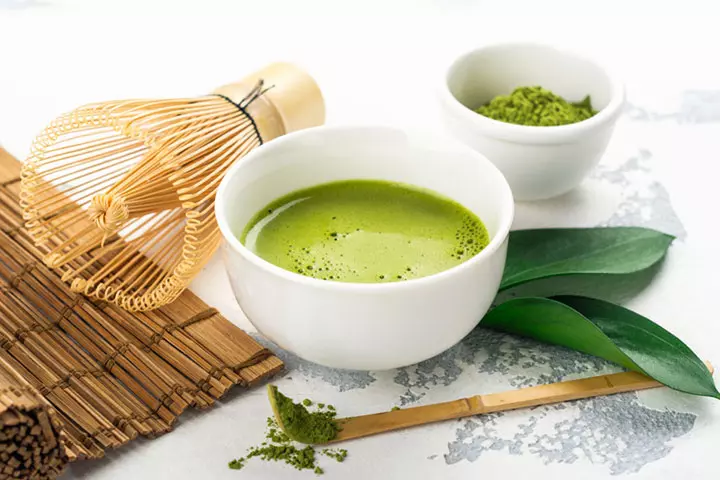
Image: Shutterstock
Yes, you can drink decaffeinated green tea. Green tea is processed to eliminate a substantial quantity of caffeine. Decaf green tea is not entirely free of caffeine as it contains about 2-5mg of caffeine per cup (237ml). Each decaf green tea maker has different levels of caffeine elimination. Therefore, check the label for precise levels of residual caffeine content, and regulate the number of cups accordingly.
Can you drink matcha tea while breastfeeding?
Yes, matcha tea is safe while breastfeeding. It is a finely grounded organic green tea that originated in China, and is processed in ways that give it higher caffeine content than regular green tea (7). Different grades of matcha have different levels of caffeine content, but it is usually thrice the standard green tea. A cup (237ml) of matcha green tea can contain about 77mg of caffeine. So, remember to adjust your caffeine consumption from other sources accordingly.
 Quick tip
Quick tipCan You Take Green Tea Pills While Breastfeeding?
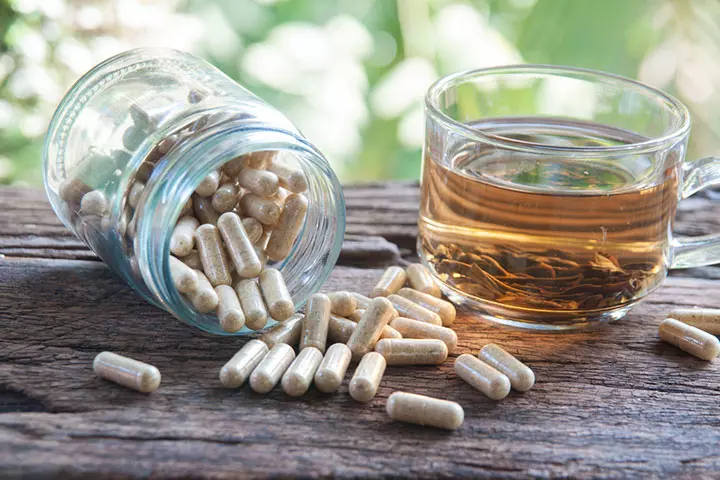
Image: Shutterstock
It is best to avoid green tea pills and capsulated green tea extracts since you may accidentally consume more caffeine than two cups of green tea. Generally, green tea capsules and other herbal supplements containing green tea contain the tea in different strengths (8). So, a single pill will keep you within safe limits of caffeine consumption, but may still exceed the quantity derived from two cups of green tea. Check the label of green tea pills to know the precise level of caffeine in each capsule.
Does Theanine In Green Tea Affect Breastfeeding?
There is no scientific evidence to substantiate either the negative or the positive effects of theanineiA type of amino acid primarily found in tea and certain mushrooms. on breastfeeding. Theanine is a type of non-essential amino acid found in abundance in green tea leaves (9).
Frequently Asked Questions
1. What are the benefits of drinking green tea when breastfeeding?
Consuming green tea during breastfeeding may help reduce high blood pressure and high cholesterol (12). These benefits may extend only when they consume it in moderation. Applying wet tea bags to the nipples may reduce pain during the first few days of nursing (13). Animal studies have shown that drinking green tea in pregnancy and when lactating may transfer its antiinflammatory properties from mothers to their offspring (14).
2. Can drinking green tea when breastfeeding increase the risk of dehydration in babies?
There is currently no scientific evidence showing that green tea when breastfeeding can cause dehydration in babies.
3. Does green tea affect the taste of breastmilk?
Caffeine, including green tea, has not been reported to change the taste of breastmilk. About 1% of the ingested caffeine appears in breastmilk and moderate intake of green tea should not cause significant caffeine transfer to the infant (15).
4. Are there specific types of green tea that are safer for breastfeeding mothers?
Yes, opt for organic green tea without additives or artificial flavors. Look for brands that label their products as safe for breastfeeding mothers and thoroughly test them for contaminants.
Green tea is a refreshing drink with many health benefits and can be consumed during breastfeeding. Since green tea, while breastfeeding, may pass into the milk, you should consume it within safe limits and watch how it affects your baby. Moreover, it is better to drink only plain green tea because you may not know how the additives might affect your baby. It has also been found that excess green tea may interfere with iron absorption in the body, so do not drink your tea along with meals. If you follow the preventive tips and keep your consumption at moderate levels, you can easily enjoy green tea while breastfeeding.
Infographic: Tips On Having Green Tea When Breastfeeding
Due to its high antioxidant content and other health-promoting properties, drinking green tea during breastfeeding is advantageous for both the mother and the baby. However, exercise caution when ingesting green tea because an excessive amount may have adverse effects. The infographic below offers suggestions for safely consuming green tea. Check out! Illustration: Momjunction Design Team
Identify the potential risks and learn safe ways to enjoy green tea while breastfeeding, ensuring the well-being of your baby. Understand if green tea poses any harm during this crucial phase.
References
- Katarzyna Budzynska et al.; (2013); Complementary Holistic and Integrative Medicine: Advice for Clinicians on Herbs and Breastfeeding.
https://www.ncbi.nlm.nih.gov/pmc/articles/PMC4530286/ - Iná S. Santos et al.; (2012); Maternal Caffeine Consumption and Infant Nighttime Waking: Prospective Cohort Study.
https://www.ncbi.nlm.nih.gov/pmc/articles/PMC3566755/ - A breastfeeding mother’s diet for an infant with colic.
https://www.canr.msu.edu/news/a_breastfeeding_mothers_diet_for_an_infant_with_colic - Alcohol & Breast Milk.
https://www.healthychildren.org/English/ages-stages/baby/breastfeeding/Pages/Alcohol-Breast-Milk.aspx - Frank S. Fan; (2016); Iron deficiency anemia due to excessive green tea drinking.
https://www.ncbi.nlm.nih.gov/pmc/articles/PMC5093162/ - P B Disler et al.; (1975); The effect of tea on iron absorption.
https://www.ncbi.nlm.nih.gov/pmc/articles/PMC1410962/ - What is matcha powder?.
https://www.canr.msu.edu/news/what_is_matcha_powder - Green Tea Extract.
https://www.urmc.rochester.edu/encyclopedia/content?contenttypeid=19&contentid=GreenTeaExtract - Improving College Exam Performance with L-theanine and Caffeine.
https://pubmed.ncbi.nlm.nih.gov/28056735/ - Green Tea
https://www.ncbi.nlm.nih.gov/books/NBK501847/ - Herbal teas during pregnancy and breastfeeding
https://www.pregnancybirthbaby.org.au/herbal-teas-during-pregnancy-and-breastfeeding - The Hidden Health Benefits of Tea.
https://www.pennmedicine.org/updates/blogs/health-and-wellness/2019/december/health-benefits-of-tea - Green tea.
https://www.ncbi.nlm.nih.gov/books/NBK501847/ - Ana C. L. Hachul et al.; (2018); Maternal consumption of green tea extract during pregnancy and lactation alters offspring’s metabolism in rats.
https://journals.plos.org/plosone/article?id=10.1371/journal.pone.0199969 - Alcohol & Breast Milk.
https://www.healthychildren.org/English/ages-stages/baby/breastfeeding/Pages/Alcohol-Breast-Milk.aspx
Community Experiences
Join the conversation and become a part of our nurturing community! Share your stories, experiences, and insights to connect with fellow parents.
Read full bio of Joanne Aubrey
Read full bio of Rohit Garoo
Read full bio of Dr. Ritika Shah
Read full bio of Shinta Liz Sunny









